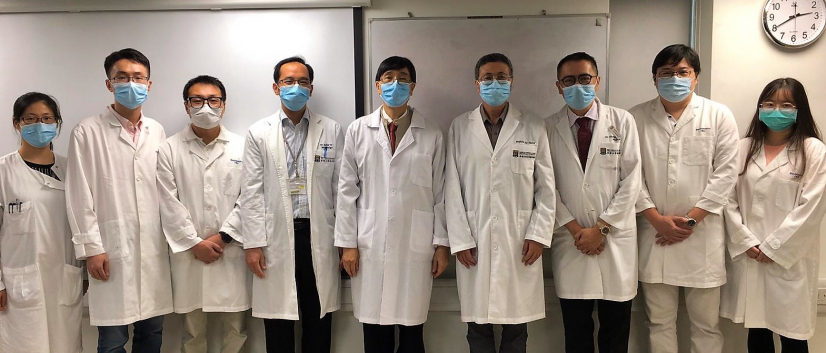Media
HKUMed researchers mine immunogenic information
from SARS-CoV-2 for rational design of vaccine against SARS-CoV-2
14 Jul 2020

Prof Huang Jian-dong, L & T Charitable Foundation Professor in Biomedical Sciences, School of Biomedical Sciences, HKUMed (4th from right); Prof Yuen Kwok-yung, Henry Fok Professor in Infectious Diseases and Chair of Infectious Diseases, Department of Microbiology, HKUMed (Centre) and Dr Kelvin To Kai-wang, Clinical Associate Professor, Department of Microbiology, HKUMed (4th from left); Dr Thomas Yau Chung-cheung, Clinical Associate Professor, Department of Medicine, HKUMed (3rd from right), together with major authors Dr Zhang Bao-zhong (3rd from left); Mr Hu Ye-fan (2nd from left); Ms Chen Lin-lei (1st from left); Dr Wang Xiao-lei (2nd from right); Ms Dou Ying (1st from right).
Researchers at the School of Biomedical Sciences, the Department of Microbiology and the Department of Medicine, LKS Faculty of Medicine of The University of Hong Kong (HKUMed) collaborated with researchers at the Institute of Synthetic Biology of Chinese Academy of Sciences - Shenzhen Institutes of Advanced Technology and the College of Life Science and Technology of Beijing University of Chemical Technology to conduct a study for mining immunogenic information from 39 COVID-19 patients in Hong Kong. The study analysed and tested immunogenic information of SARS-CoV-2 Spike protein, and then discussed the feasibility of rational design of vaccine against SARS-CoV-2 by using the information. The results are now published in life sciences journal Cell Research (link to the publication).
Currently, the Spike (S) protein of SARS-CoV-2 is widely considered as a promising antigen, which could stimulate one’s immune response against SARS-CoV-2. In vivo or in natura data of the immune response in patients, including major immune responses to S protein, are currently lacking. Therefore, it is important to mine serological information from COVID-19 patients for further rational design of vaccine against SARS-CoV-2. The study identified nine sites of Spike protein in 39 serum samples from discharged or hospitalized COVID-19 patients. Among them, four linear B cell epitopes were found in the RBD region of SARS-CoV-2. This finding provided with direct serological evidence from patients for the first time. It is necessary to reveal these sites for providing new clues to the rational design of vaccine against SARS-CoV-2.
“It might be difficult to develop SARS-CoV-2 vaccine since we need to balance safety and efficacy. Thus, we need to offer protective immune responses and avoid non-protective immune responses at the same time. In this way, it is not ideal to construct a vaccine without selecting antigens. In the long run, an ideal vaccine should be designed rationally, which can generate neutralising antibodies only but not disease enhancing antibodies. It is better to avoid all useless antibodies,” said Professor Huang Jian-dong, L & T Charitable Foundation Professor in Biomedical Sciences, School of Biomedical Sciences, HKUMed, who led the research. He and his colleagues will continue to design safe and effective vaccine against SARS-CoV-2 by utilising synthetic biology system, and further explore the feasibility of pan-coronavirus vaccine.
About the Research Team
The research was led by Prof Huang Jian-dong, L & T Charitable Foundation Professor in Biomedical Sciences, School of Biomedical Sciences, HKUMed, in collaboration with Dr Thomas Yau Chung-cheung, Clinical Associate Professor, Department of Medicine, HKUMed; Prof Ivan Hung Fan-ngai, Ru Chien and Helen Lieh Professor in Health Sciences Pedagogy, Chief of Infectious Diseases Division at Department of Medicine and Assistant Dean (Admissions) of HKUMed; Dr Kelvin To Kai-wang, Clinical Associate Professor, Department of Microbiology, HKUMed and Prof Yuen Kwok-yung, Henry Fok Professor in Infectious Diseases and Chair of Infectious Diseases, Department of Microbiology, HKUMed.
This work was supported by Health and Medical Research Fund (COVID190117) from the Government of the Hong Kong Special Administrative Region, the Shenzhen Peacock Team Project, Shenzhen Science and Technology Innovation Committee Basic Science Research Grant.
Media enquiries
Please contact LKS Faculty of Medicine of The University of Hong Kong by email (medmedia@hku.hk).
